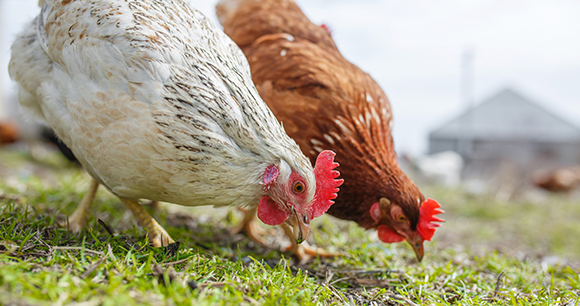When the US Department of Agriculture published proposed regulations that would establish welfare standards for animals raised under the National Organic Program (see AWI Quarterly, fall 2022), AWI quickly mobilized a coalition to garner support for the proposed rule and usher in long-awaited improvements to animal welfare on organic farms.

The proposed Organic Livestock and Poultry Standards (OLPS) rule is nearly identical to the organic animal welfare regulations finalized in the last days of the Obama administration but withdrawn the following year by the Trump administration. If implemented, it will be the first comprehensive set of on-farm welfare standards at the federal level, affecting the treatment of millions of animals raised under the federal organic program.
Notably, the rule would clarify that enclosed, screened-in porches with a roof do not qualify as outdoor access, closing a major loophole that has led to the denial of outdoor access for egg-laying hens. It would also prohibit certain painful mutilations, such as the debeaking of birds, routine tail docking of pigs, and tail docking and face branding of cattle; prohibit gestation crates for pigs; and require environmental enrichment, including rooting materials for pigs, perches for egg-laying hens, and bedding for all mammals.
AWI and the ASPCA submitted comments co-signed by 17 additional animal protection and sustainable agriculture organizations, companies, and family farms. Our comments strongly urge the USDA to use its authority under the Organic Foods Production Act to expeditiously finalize the OLPS rule and require compliance with all provisions in a timely manner for farmers to qualify for USDA Organic certification.
We advocate additional changes to the rule that would further strengthen animal welfare and more closely align USDA Organic production standards with those of third-party animal welfare certifications consumers typically rely on as proof of higher welfare conditions. We urge the USDA to require group housing of calves at an earlier age (the proposed regulations allow individual housing for up to six months); limit transport times for animals; require additional “fitness for transport” criteria in line with international guidelines; and improve outdoor space, soil, and vegetation requirements for birds and pigs to ensure animals have ample opportunities to engage in natural behaviors outdoors.
To indicate how important these regulations are to the integrity of the USDA Organic label, AWI and the ASPCA commissioned a survey to gauge consumer attitudes toward animal welfare under the National Organic Program. The results overwhelmingly demonstrate that consumers of organic products are concerned about the welfare of the animals, with 85 percent of respondents saying they think it is important for the federal government to establish clear, uniform standards for animal welfare on organic farms, and 84 percent saying these standards should meet or exceed those required under third-party animal welfare certification programs.
In addition, AWI coordinated letters from 57 representatives and 20 senators to the USDA in support of finalizing the OLPS rule. The department is considering a lengthy timeline for implementing the requirements for outdoor access for organic poultry. The lawmakers emphasized the importance of implementing this critical component as swiftly as possible.